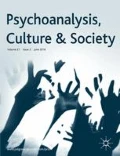Abstract
This paper begins with an ‘experience-near’ account of the author’s encounter with a woman she met whilst walking her dog in an east London park one winter afternoon. The woman was lying on the ground amongst the trees and, when approached, talked with the author about her feelings of isolation from family and community, about her alcoholism, suicidality and unsuccessful attempts to access help from the welfare state, and about the connections to animals and nature that kept her alive. The paper goes on to offer a psychoanalytically informed psychosocial commentary on this meeting and on the human relational vulnerability of which it speaks, exploring what we might learn about belonging and not belonging in the contemporary conjuncture, as welfare spending is cut, economic inequalities increase, and the ‘social investment state’ targets the ‘worthy’ welfare subject at the expense of people like Linda. The paper discusses the resonances between Linda’s life as glimpsed through this encounter and the author’s recent psychosocial research on intimacy and care under conditions of individualisation and detraditionalisation. Through this, the paper explores the practices of ethical relationality that are at the heart of the individual’s struggle to belong and through which social belonging is created.
Similar content being viewed by others
Notes
Compulsorily detained under the Mental Health Act 1983.
See Giddens (1992) and Beck and Beck-Gernsheim (1995; 2002) for theorizations of individualisation and the de-traditionalisation of intimate life, and see Roseneil (2006; 2007; 2009) and Roseneil and Budgeon (2004) for empirical investigations and psychoanalytically informed reworkings of these theories.
On the long history of the construction of worthy and unworthy, deserving and undeserving welfare subjects in England, see Mann (1992).
For a convincing argument that ‘social investment’ rather than ‘neoliberalism’ is the organising principle of contemporary European (and many Latin American) welfare states, see Jenson (2009).
References
Beck, U. and Beck-Gernsheim, E. (1995) The Normal Chaos of Love. Cambridge: Polity Press.
Beck, U. and Beck-Gernsheim, E. (2002) Individualisation. London: Sage.
Clarke, J. (2005) New Labour’s citizens: Activated, empowered, responsibilized, abandoned? Critical Social Policy 25 (4): 447–463.
Dwyer, P. (2004) Agency, ‘dependency’ and welfare: Beyond issues of claim and contribution? In: H. Dean (ed.) The Ethics of Welfare. Bristol: Policy Press, pp. 135–154.
Giddens, A. (1992) The Transformation of Intimacy: Sexuality, Love and Eroticism in Modern Societies. Cambridge: Polity Press.
Jenson, J. (2009) Lost in translation: The social investment perspective and gender equality. Social Politics 14 (6): 446–483.
Jenson, J. and Saint-Martin, D. (2003) New routes to social cohesion? Citizenship and the social investment state. The Canadian Journal of Sociology/Cahiers Canadiens De Sociologie 28 (1): 77–99.
Mann, K. (1992) The Making of an English ‘Underclass’? The Social Divisions of Welfare and Labour. Milton Keynes: Open University Press.
Newman, J. (2001) Modernising Governance: New Labour, Policy and Society. London: Sage.
Newman, J. and Tonkens, E. (eds.) (2011) Participation, Responsibility and Choice: Summoning the Active Citizen in Western European Welfare States. Amsterdam: Amsterdam University Press.
Roseneil, S. (2006) The ambivalences of angel’s ‘arrangement’: A psycho-social lens on the contemporary condition of personal life. The Sociological Review 54 (4): 847–69.
Roseneil, S. (2007) Queer individualisation: The transformation of personal life in the early 21st century. NORA: Nordic Journal of Women’s Studies International Forum 15 (2–3): 84–99.
Roseneil, S. (2009) Haunting in an age of individualisation: Subjectivity, relationality and the traces of the lives of others. European Societies 11 (3): 411–30.
Roseneil, S. and Budgeon, S. (2004) Cultures of intimacy and care beyond ‘the family’: Personal life and social change in the early 21st century. Current Sociology 52 (2): 135–59.
Scanlon, C. and Adlam, J. (2008) Refusal, social exclusion and the cycle of rejection: A cynical analysis. Critical Social Policy 28 (4): 529–549.
Author information
Authors and Affiliations
Rights and permissions
About this article
Cite this article
Roseneil, S. On meeting Linda: An intimate encounter with (not-)belonging in the current conjuncture. Psychoanal Cult Soc 19, 19–28 (2014). https://doi.org/10.1057/pcs.2013.24
Published:
Issue Date:
DOI: https://doi.org/10.1057/pcs.2013.24



